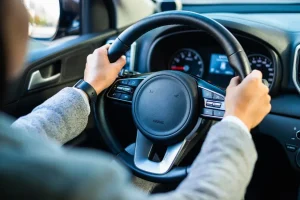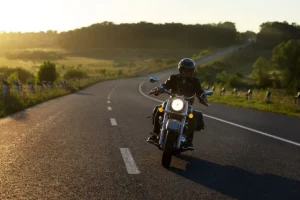Someone damaged my motorcycle in the church parking lot while I was at my wife’s funeral.
They just didn’t like an old man with a leather vest who didn’t fit in with their fancy country club lifestyle, so they did it.
For the service, I had parked my well-kept Harley Electra Glide. It was overturned and badly damaged when I got back, already inconsolable by losing my wife, and it had a sign that read, “BIKER TRASH GET OUT,” stuck to it.
This was a personal incident, not a chance occurrence. It originated from the same “respectable” individuals who had feigned concern during the funeral.
It all began six months ago when we moved to the upscale planned neighborhood of Cedar Hills. Our former house was too much for Barbara, whose illness had returned to stage four.
Caroline, our daughter, located a tiny house for us in a “nice neighborhood,” as she put it. In reality, she meant “proper.” She was saying, “No bikes.” “Dad, it’s time to change,” she meant.

At seventy-two, I had no intention of altering who I was. I called my 2008 Harley Electra Glide the Black Widow, and it moved with us when we moved. It has been with me through fifteen states and two major operations. The problems started on the first day.
Before we had even unloaded, the homeowners’ association president, Howard Parkman, showed up at our door. He had a fake smile on his face and a clipboard in his hand.
He looked beyond me to Barbara, who was directing the movers, and said, “Welcome to Cedar Hills.” I wanted to share our community rules with you. Make sure to review the transportation section 12-B.
Before I saw, I understood what he meant. “No motorcycles, boats, or recreational vehicles may be parked in driveways or where people can see them from the street,” the rule stated.

I told him, staring him in the eye, “My bike goes in the garage.” “It has for the past 40 years.”
Howard tightened his grin. It’s okay for the time being. People who live in Cedar Hills usually drive more conventional cars. “Here, we have certain standards.”
Barbara came over to put her hand in mine. Her voice was powerful despite the frailty brought on by the chemotherapy.
It isn’t going anywhere, Mr. Parkman. My spouse has been riding that bike since before you bought your first car.
Howard stepped back after taking a quick look at her headgear.
He answered, “We can discuss it at a later time,” and turned to go. “Greetings from the neighborhood.”
From the other side of the parking lot, that same Howard was now observing. It was all in the small smirk on his face. He believed he had won. believed he had damaged the ancient motorcycle.
For six months, Barbara fought illness, while I took care of the neighborhood. If I started riding my bike before 8 a.m., people would complain that I was generating “too much noise.” I take great care of my driveway, therefore there were no oil spots, despite anonymous allegations to the contrary. Every time I put my Harley outside to clean the garage, people would leave messages on it.
Howard always showed there with his clipboard and the same fake smile when something happened.

He would say, “Just a quick reminder about Rule 12-B.” “A few neighbors are concerned.”
Barbara thought it was kind of hilarious, even as she grew ill.
“They believe that the largest issue in this area is a motorcycle?” She would say, laughing weakly. “Wait until I begin to haunt the place.”
But when Barbara died one Tuesday morning in October, everything was different. As she departed, I held her hand—the woman who had accompanied me on thousands of miles of rides, without once asking me to alter who I was.
On Friday, her funeral took place. Michael drove up from Texas, and Caroline drove in from Seattle. The same people who had lately complained about my bike now packing our house with casseroles.
Caroline had a lovely conversation that evening. “Dad, it might be time to think about selling the Harley.” Mom has left. You are 72 years old. Furthermore, it is obvious that this community does not support that way of life.
When I looked at my daughter, who is now a lawyer, a mother of two, and the driver of a useful SUV, I saw how much she had changed from the young child who liked to ride in my sidecar while sporting her tiny leather jacket.
I answered, “The bike stays.” “Your mother never once asked me to give it up.”
She started to continue, “But Mom’s not—” and stopped, but I understood that she was referring to the fact that Mom was no longer there.
I reiterated, “The bike stays,” to end the discussion.
I got to the church early on the morning of the funeral in order to speak with the pastor.
When they heard the engine, some people shot me glares, but I didn’t mind. Barbara would have thought I’d show up on two wheels, like I always do.
It was a beautiful service. Most of the neighbors were there, along with Howard and his wife. They offered me their condolences and spoke kindly of Barbara. Howard even nodded, as though I had finally lived up to his expectations, and seemed surprised that I was wearing a suit.

My motorcycle had been vandalized when I went outside after that.
“Oh my God,” Caroline cried as she ran over. “I’m so sorry, Dad.”
I remained silent. I just stared at the broken bike that Barbara had helped me pick out and take care of, with the hurtful comments painted on it. While several around us murmur incredulously, I saw that not many of our neighbors were shocked.
When I called, Officer Reynolds showed there and shook his head as he got his report ready.
He said he “never got why people go after bikes.” “It is cowardly.”
“It wasn’t random,” I clarified. “It was intimate.”
He gave me a glance. “Do you think this would be done at a funeral?”
I turned to see Howard standing with other Cedar Hills homeowners across the parking lot, obviously happy with the outcome.
“More than I thought,” I replied.
The bike was damaged, but it was still functional. I refused to let Caroline put it in her rental car so she could drive me home.

I informed her, “I’ve ridden through worse.”
In actuality, I required the ride. I needed the feel of the bike underfoot, the sound of the engine, and the wind. I wanted something to fill the gap Barbara had created.
Family and friends gathered for the reception back at the house. I took off my suit and changed into jeans and a shirt, but I left on my leather vest, which bore the logo of the Iron Horses MC, the group I had ridden with for years, and my Vietnam Veteran patch.
I was standing at the food table with a plate of unopened sandwiches when Howard approached.
He didn’t seem to mean it when he said, “Terrible about your motorcycle.” “Perhaps it’s an indication to consider something more appropriate for Cedar Hills.”
I made eye contact with him. “The only indication I see is that my bike was damaged during a funeral by a coward here.”
He flushed. “I have no knowledge of that.”
I said, “Never said you did.” “But whoever did ought to be familiar with me.”
“What’s that?” he inquired, obviously interested.
“My parents, my wife, and the sixteen brothers I rode with have all been buried. I have nothing more to lose. I leaned closer. “And I always figure out who has wronged me.”
